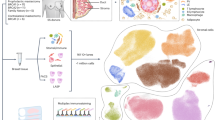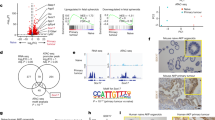Abstract
Myeloid translocation genes (MTGs), originally identified as chromosomal translocations in acute myelogenous leukemia, are transcriptional corepressors that regulate hematopoietic stem cell programs. Analysis of The Cancer Genome Atlas (TCGA) database revealed that MTGs were mutated in epithelial malignancy and suggested that loss of function might promote tumorigenesis. Genetic deletion of MTGR1 and MTG16 in the mouse has revealed unexpected and unique roles within the intestinal epithelium. Mtgr1−/− mice have progressive depletion of all intestinal secretory cells, and Mtg16−/− mice have a decrease in goblet cells. Furthermore, both Mtgr1−/− and Mtg16−/− mice have increased intestinal epithelial cell proliferation. We thus hypothesized that loss of MTGR1 or MTG16 would modify Apc1638/+-dependent intestinal tumorigenesis. Mtgr1−/− mice, but not Mtg16−/− mice, had a 10-fold increase in tumor multiplicity. This was associated with more advanced dysplasia, including progression to invasive adenocarcinoma, and augmented intratumoral proliferation. Analysis of chromatin immunoprecipitation sequencing data sets for MTGR1 and MTG16 targets indicated that MTGR1 can regulate Wnt and Notch signaling. In support of this, immunohistochemistry and gene expression analysis revealed that both Wnt and Notch signaling pathways were hyperactive in Mtgr1−/− tumors. Furthermore, in human colorectal cancer (CRC) samples MTGR1 was downregulated at both the transcript and protein level. Overall our data indicates that MTGR1 has a context-dependent effect on intestinal tumorigenesis.
This is a preview of subscription content, access via your institution
Access options
Subscribe to this journal
Receive 50 print issues and online access
$259.00 per year
only $5.18 per issue
Buy this article
- Purchase on Springer Link
- Instant access to full article PDF
Prices may be subject to local taxes which are calculated during checkout






Similar content being viewed by others
References
American Cancer Society Cancer Facts & Figures 2010. American Cancer Society: Atlanta, GA, USA, 2010.
Korinek V, Barker N, Morin PJ, van Wichen D, de Weger R, Kinzler KW et al. Constitutive transcriptional activation by a beta-catenin-Tcf complex in APC−/− colon carcinoma. Science 1997; 275: 1784–1787.
Sansom OJ, Reed KR, Hayes AJ, Ireland H, Brinkmann H, Newton IP et al. Loss of Apc in vivo immediately perturbs Wnt signaling, differentiation, and migration. Genes Dev 2004; 18: 1385–1390.
MacDonald BT, Tamai K, He X . Wnt/b-catenin signaling: components, mechanisms, and diseases. Dev Cell 2009; 17: 9–26.
Su LK, Kinzler KW, Vogelstein B, Preisinger AC, Moser AR, Luongo C et al. Multiple intestinal neoplasia caused by a mutation in the murine homolog of the APC gene. Science 1992; 256: 668–670.
Groden J, Thliveris A, Samowitz W, Carlson M, Gelbert L, Albertsen H et al. Identification and characterization of the familial adenomatous polyposis coli gene. Cell 1991; 66: 589–600.
Nishisho I, Nakamura Y, Miyoshi Y, Miki Y, Ando H, Horii A et al. Mutations of chromosome 5q21 genes in FAP and colorectal cancer patients. Science 1991; 253: 665–669.
Zecchini V, Domaschenz R, Winton D, Jones P . Notch signaling regulates the differentiation of post-mitotic intestinal epithelial cells. Genes Dev 2005; 15: 1686–1691.
Bray SJ . Notch signalling: a simple pathway becomes complex. Nat Rev Mol Cell Biol 2006; 7: 678–689.
Fre S, Huyghe M, Mourikis P, Robine S, Louvard D, Artavanis-Tsakonas S . Notch signals control the fate of immature progenitor cells in the intestine. Nature 2005; 435: 964–968.
Kopan R, Ilagan MXG . The canonical Notch signaling pathway: unfolding the activation mechanism. Cell 2009; 137: 216–233.
Katoh M, Katoh M . Notch signaling in gastrointestinal tract [review]. Int J Oncol 2007; 30: 247–251.
Peignon G, Durand A, Cacheux W, Ayrault O, Terris B, Laurent-Puig P et al. Complex interplay between β-catenin signalling and Notch effectors in intestinal tumorigenesis. Gut 2011; 60: 166–176.
van Es JH, van Gijn ME, Riccio O, van den Born M, Vooijs M, Begthel H et al. Notch/gamma-secretase inhibition turns proliferative cells in intestinal crypts and adenomas into goblet cells. Nature 2005; 435: 959–963.
Fre S, Pallavi SK, Huyghe M, Laé M, Janssen K-P, Robine S et al. Notch and Wnt signals cooperatively control cell proliferation and tumorigenesis in the intestine. Proc Natl Acad Sci USA 2009; 106: 6309–6314.
Davis JN, McGhee L, Meyers S . The ETO (MTG8) gene family. Gene 2003; 303: 1–10.
Amann JM, Chyla BJI, Ellis TC, Martinez A, Moore AC, Franklin JL et al. Mtgr1 is a transcriptional corepressor that is required for maintenance of the secretory cell lineage in the small intestine. Mol Cell Biol 2005; 21: 9576–9585.
Chyla BJ, Moreno-Miralles I, Steapleton Ma, Thompson MA, Bhaskara S, Engel M et al. Deletion of Mtg16, a target of t(16;21), alters hematopoietic progenitor cell proliferation and lineage allocation. Mol Cell Biol 2008; 28: 6234–6247.
Sjoblom T, Jones S, Wood L, Parons D, Lin J, Barber T et al. The consensus coding sequences of human breast and colorectal cancers. Science 2006; 314: 268–274.
Gao J, Aksoy BA, Dogrusoz U, Dresdner G, Gross B, Sumer SO et al. Integrative analysis of complex cancer genomics and clinical profiles using the cBioPortal. Sci Signal 2013; 6: pl1.
Cerami E, Gao J, Dogrusoz U, Gross BE, Sumer SO, Aksoy BA et al. The cBio Cancer Genomics Portal: an open platform for exploring multidimensional cancer genomics data. Cancer Discov 2012; 2: 401–404.
Calabi F, Pannell R, Pavloska G . Gene targeting reveals a crucial role for MTG8 in the gut. Mol Cell Biol 2001; 21: 5658–5666.
Poindexter SV, Reddy VK, Mittal MK, Williams AM, Washington MK, Harris E et al. Transcriptional co-repressor MTG16 regulates small intestinal crypt proliferation and crypt regeneration after radiation-induced injury. Am J Physiol 2015; 308: 562–571.
Parang B, Rosenblatt D, Williams A, Washington MK, Revetta F, Short SP et al. The transcriptional corepressor MTGR1 regulates intestinal secretory lineage allocation. FASEB J 2014; 29: 786–795.
Williams CS, Bradley AM, Chaturvedi R, Singh K, Piazuelo MB, Chen X et al. MTG16 contributes to colonic epithelial integrity in experimental colitis. Gut 2013; 62: 1446–1455.
Soler E, Andrieu-Soler C, De Boer E, Bryne JC, Thongjuea S, Stadhouders R et al. The genome-wide dynamics of the binding of Ldb1 complexes during erythroid differentiation. Genes Dev 2010; 24: 277–289.
Martinez JA, Williams CS, Amann JM, Ellis TC, Moreno-Miralles I, Washington MK et al. Deletion of Mtgr1 sensitizes the colonic epithelium to dextran sodium sulfate-induced colitis. Gastroenterology 2006; 131: 579–588.
Barrett CW, Fingleton B, Williams A, Ning W, Fischer MA, Washington MK et al. MTGR1 is required for tumorigenesis in the murine AOM/DSS colitis-associated carcinoma model. Cancer Res 2011; 71: 1302–1312.
Kochetkova M, Mckenzie OL, Bais AJ, Martin JM, Secker GA, Seshadri R et al. CBFA2T3 (MTG16) is a putative breast tumor suppressor gene from the breast xancer loss of heterozygosity region at 16q24.3. Cancer Res 2002; 16: 4599–4604.
Reva B, Antipin Y, Sander C . Predicting the functional impact of protein mutations: application to cancer genomics. Nucleic Acids Res 2011; 39: e118.
Mi H, Muruganujan A, Thomas PD . PANTHER in 2013: modeling the evolution of gene function, and other gene attributes, in the context of phylogenetic trees. Nucleic Acids Res 2013; 41: D377–D386.
Krämer A, Green J, Pollard J, Tugendreich S . Causal analysis approaches in Ingenuity Pathway Analysis. Bioinformatics 2014; 4: 523–530.
Smith JJ, Deane NG, Wu F, Merchant NB, Zhang B, Jiang A et al. Experimentally derived metastasis gene expression profile predicts recurrence and death in patients with colon cancer. Gastroenterology 2010; 138: 958–968.
Williams CS, Zhang B, Smith JJ, Jayagopal A, Barrett CW, Pino C et al. BVES regulates EMT in human corneal and colon cancer cells and is silenced via promoter methylation in human colorectal carcinoma. J Clin Invest 2011; 121: 4056–4069.
Moore AC, Amann JM, Williams CS, Tahinci E, Farmer TE, Martinez JA et al. Myeloid translocation gene family members associate with T-cell factors (TCFs) and influence TCF-dependent transcription. Mol Cell Biol 2008; 28: 977–987.
Yang K, Popova NV, Wan CY, Lozonschi I, Tadesse S, Kent S et al. Interaction of Muc2 and Apc on Wnt signaling and in intestinal tumorigenesis: potential role of chronic inflammation. Cancer Res 2008; 68: 7313–7322.
Silverman KA, Koratkar R, Siracusa LD, Buchberg AM . Identification of the modifier of Min 2 (Mom2) locus, a new mutation that influences Apc-induced intestinal neoplasia. Genome Res 2002; 12: 88–97.
Weyden L, Van Der, Arends MJ, Dovey OM, Harrison HL, Lefebvre G . Loss of Rassf1a co-operates with Apc Min to accelerate intestinal tumourigenesis. Oncogene 2008; 27: 4503–4508.
Kazanjian A, Noah T, Brown D, Burkart J, Shroyer NF . Atonal homolog 1 is required for growth and differentiation effects of Notch/gamma-secretase inhibitors on normal and cancerous intestinal epithelial cells. Gastroenterology 2010; 139: 918–928.
Terzić J, Grivennikov S, Karin E, Karin M . Inflammation and colon cancer. Gastroenterology 2010; 138: 2101–2114.
Garg P, Sarma D, Jeppsson S, Patel NR, Gewirtz AT, Merlin D et al. Matrix metalloproteinase-9 functions as a tumor suppressor in colitis-associated cancer. Cancer Res 2010; 70: 792–801.
Salcedo R, Worschech A, Cardone M, Jones Y, Gyulai Z, Dai R-M et al. MyD88-mediated signaling prevents development of adenocarcinomas of the colon: role of interleukin 18. J Exp Med 2010; 207: 1625–1636.
Sinnamon MJ, Carter KJ, Fingleton B, Matrisian LM . Matrix metalloproteinase-9 contributes to intestinal tumourigenesis in the adenomatous polyposis coli multiple intestinal neoplasia mouse. Int J Exp Pathol 2008; 89: 466–475.
Lee SH, Hu L-L, Gonzalez-Navajas J, Seo GS, Shen C, Brick J et al. ERK activation drives intestinal tumorigenesis in Apc(min/+) mice. Nat Med 2010; 16: 665–670.
Fukata M, Chen A, Vamadevan AS, Cohen J, Breglio K, Krishnareddy S et al. Toll-like receptor-4 promotes the development of colitis-associated colorectal tumors. Gastroenterology 2007; 133: 1869–1881.
Li Y, Teo WL, Low MJ, Meijer L, Sanderson I, Pettersson S et al. Constitutive TLR4 signalling in intestinal epithelium reduces tumor load by increasing apoptosis in APC(Min/+) mice. Oncogene 2014; 33: 369–377.
Dahl JA, Collas P . A quick and quantitative chromatin immunoprecipitation assay for small cell samples. Front Biosci 2007; 12: 4925–4931.
Trapnell C, Pachter L, Salzberg SL . TopHat: discovering splice junctions with RNA-Seq. Bioinformatics 2009; 25: 1105–1111.
Anders S, Huber W . Differential expression analysis for sequence count data. Genome Biol 2010; 11: R106.
Benjamini Y, Drai D, Elmer G, Kafkafi N, Golani I . Controlling the false discovery rate in behavior genetics research. Behav Brain Res 2001; 125: 279–284.
Acknowledgements
We thank the members of the Williams lab, and Karie Ballard for help in revising and proofreading the manuscript. We also thank Dr R Daniel Beauchamp, David Bader and Barbara Fingleton for their advice and counsel in preparing the manuscript. This work was supported by the National Institutes of Health Grants K08DK080221, R01DK099204 (to CSW), P50CA095103 (to MKW), 1F30DK096718 (to BP), 1F31 CA167920 (to CWB), T32 GM07347 (NIH/NIGMS) (to BP), Merit Review Grant from the Office of Medical Research, Department of Veterans Affairs 1I01BX001426 (to CSW), ACS-RSG 116552 (to CSW), R01AT004821 (to KTW), P30DK058404 (Vanderbilt Digestive Disease Research Center), NIH Grant UL1TR000445 (Vanderbilt CTSA). The funders had no role in study design, data collection and analysis, decision to publish or preparation of the manuscript.
Author information
Authors and Affiliations
Corresponding author
Ethics declarations
Competing interests
The authors declare no conflict of interest.
Additional information
Supplementary Information accompanies this paper on the Oncogene website
Supplementary information
Rights and permissions
About this article
Cite this article
Parang, B., Bradley, A., Mittal, M. et al. Myeloid translocation genes differentially regulate colorectal cancer programs. Oncogene 35, 6341–6349 (2016). https://doi.org/10.1038/onc.2016.167
Received:
Revised:
Accepted:
Published:
Issue Date:
DOI: https://doi.org/10.1038/onc.2016.167
This article is cited by
-
Transcriptomic and proteomic signatures of stemness and differentiation in the colon crypt
Communications Biology (2020)



